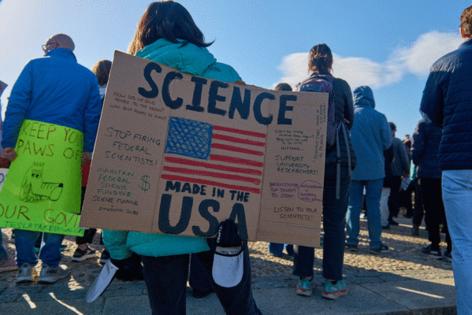Supreme Court lets US cut millions of dollars in NIH grants
Published in Political News
A splintered U.S. Supreme Court let the Trump administration at least temporarily cut off millions of dollars in medical research grants that government officials say don’t align with the president’s policies.
The justices partially put on hold a federal trial judge’s decision that the National Institutes of Health acted in an “arbitrary and capricious” manner when it terminated thousands of grants as part of President Donald Trump’s crackdown on diversity, equity and inclusion.
The decision wasn’t a total win for Trump. The Supreme Court kept in place U.S. District Judge William Young’s block on NIH guidance documents that bar funding for research connected to DEI, gender-identity, vaccine hesitancy, COVID or climate change.
But the court indicated on a 5-4 vote that the Boston-based judge lacked jurisdiction to order reinstatement of specific grants. Chief Justice John Roberts joined the court’s three liberals in dissent on that issue.
The challengers, which include research organizations and states whose universities rely on NIH funding, said the cutoff would set back crucial research by years, if not decades.
“A stay would abruptly, and in many cases permanently, halt lifesaving biomedical research that Congress has directed the NIH to fund, with irreparable consequences for scientific progress,” the groups, led by the American Public Health Organization, argued in court papers.
The administration told the Supreme Court the NIH was being forced to keep paying out $783 million, though the challengers called that a made-up figure.
“The government is irreparably harmed when forced to pay out millions of dollars on discretionary grants, with no guarantee of recouping the money,” U.S. Solicitor General D. John Sauer wrote in court papers. Sauer is the administration’s top Supreme Court lawyer.
The high court said the government would risk “irreparable harm” if it were forced to disburse the money before the litigation was resolved. “The plaintiffs do not state that they will repay grant money if the government ultimately prevails,” the court said.
Justices Neil Gorsuch, Brett Kavanaugh and Amy Coney Barrett each said in a separate opinion that claims over particular grants belong in the Court of Federal Claims, a specialized tribunal that handles cases involving contracts with the U.S. government.
Barrett, the only justice who didn’t partially dissent, was the pivotal vote in the case. Gorsuch, Kavanaugh and Justices Clarence Thomas and Samuel Alito all indicated they would have let the NIH guidance go back into effect.
NIH officials used templated letters to notify recipients that funding was being withheld. The letters that cited DEI said such studies “are often used to support unlawful discrimination on the basis of race and other protected characteristics, which harms the health of Americans.”
In blocking the cutoff, Young said the NIH never defined the prohibited research categories and relied on circular reasoning in templated letters to explain why specific grants were being terminated. Young called the cutoff “breathtakingly arbitrary and capricious” in violation of the federal law that governs the procedural workings at federal agencies.
Administration officials “in their haste to appease the executive, simply moved too fast and broke things, including the law,” Young wrote.
The Boston-based 1st U.S. Circuit Court of Appeals voted 3-0 to keep Young’s order in place, prompting the administration to turn to the Supreme Court.
The case is National Institutes of Health v. American Public Health Association, 25A103.
_____
©2025 Bloomberg News. Visit at bloomberg.com. Distributed by Tribune Content Agency, LLC.
























































Comments